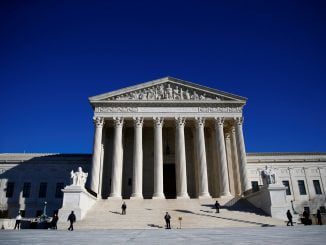
WASHINGTON, D.C. — Now that Roe v. Wade has been toppled, pro-life activists are taking a multifaceted approach in their quest to end abortions nationwide, targeting their strategies to the dynamics of each state as they attempt to create new laws and defend bans in courts.
One anti-abortion group has proposed model legislation that would ban all abortions except to prevent the death of a pregnant woman. New legal frontiers could include prosecuting doctors who defy bans, and skirmishes over access to medication abortions already are underway. Others hope to get more conservatives elected in November to advance an anti-abortion agenda.
“For Republicans, the post-Roe world will be significantly different, from a legal perspective,” said Jonathan Turley, a professor at George Washington University Law School. “For the last 50 years, Republicans have been on the offense by chipping away on the edges of Roe. Now they are going to be playing defense in all 50 states.”
The U.S. Supreme Court’s decision overturning Roe v. Wade said abortion is not a right under the Constitution, creating an opening for states pushing to get more restrictions on the books. Most recently, lawmakers in West Virginia and Indiana have pushed ahead with new restrictions, with varying success.
James Bopp Jr., general counsel for National Right to Life, has worked on model legislation for states, but said with few legislatures in session “the process of adopting new laws is really just beginning.”
It recommends banning all abortions except to prevent the death of a pregnant woman, though it provides language for states that want to make exceptions in cases of rape or incest. It also recommends criminal penalties for any person, including a doctor, who knowingly or intentionally causes or aids an “unlawful abortion.”
The model law would not criminalize a woman who gets an abortion.
Conservatives also see new courtroom battles on the horizon.
Jonathan Mitchell, the former Texas solicitor general who is now a private practice attorney, came up with some of the key components of a Texas law that bans abortions after fetal cardiac activity is detected. His innovation was to make violations enforceable through lawsuits filed by citizens, rather than the government.
Mitchell, who represents Texas and South Dakota in abortion lawsuits and has helped lawmakers in multiple states develop abortion bans and restrictions, said future legal fights could center around those who pay for abortions for people living in states with bans that are not being enforced due to court injunctions.
“Abortion is still a criminal offense in every state with a trigger law or pre-Roe ban, regardless of whether a state-court injunction is in effect,” Mitchell said in an email to The Associated Press. He said an injunction doesn’t actually block a law as many believe, but temporarily keeps it from being enforced.
He said employers or those who help fund abortions in states such as Utah, Kentucky, Louisiana, or West Virginia are violating the law and could be prosecuted. He said if bans exist but are on hold, abortion providers could be prosecuted retroactively.
“And the mere risk of potential lawsuits may be enough to deter abortion providers from offering abortions to out-of-state residents, especially when these lawsuits can be brought,” he wrote, “not only against the physician but everyone else involved.”
Erin Hawley, a lawyer at the conservative Alliance Defending Freedom and the wife of Republican U.S. Sen. Josh Hawley of Missouri, expects continuing litigation over medication abortions.
She pointed to a court battle underway in Mississippi, where drugmaker GenBioPro is suing the state over its provisions that make it harder to get a prescription for mifepristone, a drug that can induce abortion. The state’s policies are at odds with U.S. Food and Drug Administration regulations, which courts have generally found take precedence over state law.
But Hawley said that might not apply here.
“It’s always a big deal for a federal agency or law to trump state law,” Hawley said.
Some states are taking different approaches.
Texas sued the federal government in mid-July after the Biden administration issued guidance that stated hospitals are required to provide abortions if necessary to save a mother’s life.
Bopp said while court battles and midterm elections are the current focus, abortion opponents would eventually like to see federal and state constitutional amendments that would explicitly protect the unborn, though he acknowledged that would be a challenge.
“A constitutional amendment has been one of our goals. But this requires a hell of a consensus,” he said.



